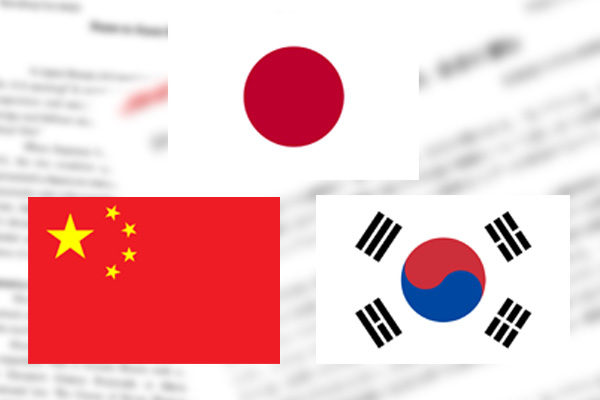The government of Prime Minister Shigeru Ishiba’s pro-China stance has grown even more precarious. It plans to invite Chinese Communist Party Politburo member and Foreign Minister Wang Yi to visit Japan in February, when a trilateral meeting between Japanese, Chinese, and South Korean foreign ministers is also planned. It also expects to organize a trilateral leaders’ meeting in spring or later. The idea of concluding a Japan-China-South Korea free trade agreement (FTA) is emerging in the process.
Beijing aiming to get around structural issues
China is pressing Japan to enter into substantial negotiations on the trilateral FTA. In May last year, the leaders of Japan, China, and South Korea agreed to “keep discussions for speeding up negotiations” for their FTA, which have been suspended since 2019. They vowed to aim at realizing a “comprehensive, high-quality” FTA. This is because the proposed FTA will be meaningless unless it exceeds the level of the Regional Comprehensive Economic Partnership (RCEP) Agreement of which the three countries are members.
Japan believes it’s important to limit China’s industrial subsidy policy and preferential treatment for state-owned enterprises. China tries to get around such structural issues. But substantial negotiations are possible only when China is expected to accept talks on these outstanding issues.
Chinese subsidies have led to overproduction of electric vehicles and solar panels, distorting global markets with their dumping exports. Japan, along with the United States and Europe, has placed great importance on demanding fairness from China. Meanwhile, China has banned imports of Japanese fishery products and imposed export restrictions on critical minerals such as graphite. The elimination of such economic coercion should also be a major prerequisite for entering into trilateral FTA negotiations. China seeks to launch full FTA talks while leaving these issues unanswered.
Trump team may suspect Japan
China’s aim at entering the trilateral FTA talks relates to its U.S. strategy. While promoting itself as a free trade champion, China intends to incorporate Japan and South Korea into its supply chains and shake the U.S. in anticipation of intensifying confrontation with the incoming Trump administration. I am afraid the Ishiba government could get ahead of itself despite such ulterior motive of China. Foreign Minister Takeshi Iwaya visited China in December and offered to relax visa requirements for Chinese citizens, launching the government’s efforts to court China.
How would the U.S. react when it comes to the trilateral Japan-China-South Korea FTA amid such Japanese efforts? The U.S. could suspect that Japan might promote market integration with China. While seeking a meeting with Trump in February, Ishiba’s leaning towards appeasing China will induce a harsh reaction from the incoming Trump administration. It is essential for Japan to make it clear to the U.S. that the FTA talks will provide an opportunity to tackle China’s structural problems. Unless Japan deals with the matter cautiously and resolutely, a serious rift may arise in Japan-U.S. relations.
China’s ulterior motive of joining TPP
China’s next target will be its accession to the Trans-Pacific Partnership (TPP) free trade agreement. China is likely to intensify efforts to start its TPP accession negotiations. China believes that if the trilateral Japan-China-South Korea FTA can be achieved, it will be easier to persuade Japan that leads the TPP. China envisions that once TPP accession talks are launched, it will be able to attract TPP member countries with its giant market and strike an agreement with individual countries through bilateral negotiations. If China joins the TPP before the U.S., it can block the U.S.’ return to the TPP and exclude it from the Asian economic zone. If Japan easily accepts the initial FTA talks, it will fall in China’s trap.
Japan is now confronted with such series of Chinese strategies. If the Ishiba government changes Japan’s previous course and embark on a policy of wooing China, it will invite serious problems in the future.
Masahiko Hosokawa is a professor at Meisei University and a former director-general of the Trade Control Department at Japan’s Ministry of Economy, Trade and Industry. He is also a Planning Committee member at the Japan Institute for National Fundamentals.


